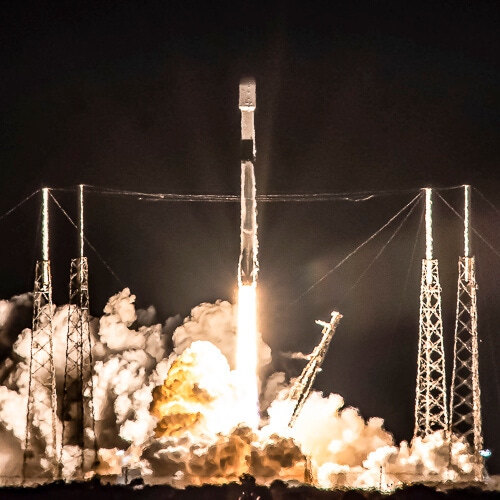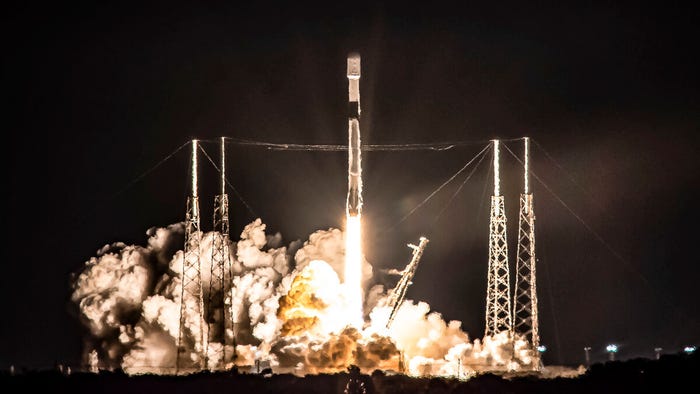
Elon Musk now says SpaceX will list its Internet venture Starlink as soon as its cash flow becomes predictable.
The Tesla CEO said when he does list, he will do his "best to give long-term Tesla shareholders preference."
Though doubling down on his IPO promise, he also says this could be "at least a few years."
Figure 1:  To the moon: Musk and satellite stans on Twitter and Reddit are eager to invest in Starlink, but they may have a bit of a wait.
To the moon: Musk and satellite stans on Twitter and Reddit are eager to invest in Starlink, but they may have a bit of a wait.
(Source: Official SpaceX Photos on Flickr CC2.0)
Going public any sooner "would be very painful," he explains.
Taken together, the two statements could be read as a not-so-subtle encouragement to investors to buy his Tesla shares (which went up in value afterward).
Starlink is the most valuable piece of SpaceX, estimates Morgan Stanley analyst Adam Jonas – with its individual parts worth $42 billion, out of a total SpaceX value around 74 billion.
Even so, Musk has previously said SpaceX would need to "pass through a deep chasm of negative cash flow" over the next year or so to make Starlink financially viable.
The company estimates Starlink will cost $10 billion a year to build, but once built it could bring in $30 billion a year.
Also it comes as little surprise Musk, who with Donald Trump's departure remains the platform's Tweeter-in-chief, made the announcement in a tweet, replying to a question.
Going global...
Meanwhile, Starlink's army of satellite Internet transmitters will stretch to provide continuous coverage around the globe by September, says Gwynne Shotwel, SpaceX's president.
For now, 1,800 satellites should be enough to guarantee continuous coverage. But Starlink aims to have 12,000 satellites in orbit 340 miles above the earth.
The satellites alone in a fleet that big will be worth around $10 billion.
Starlink still needs regulatory approval to go into new markets. Its Better Than Nothing beta version, for now, is available in just 11 countries.
Who else wants to pay for Starlink with #Dogecoin?
— Matt Wallace ⚠️ (@MattWallace888) June 24, 2021
Still, the pace of Starlink's rollout makes it an enviable market leader in a space starting to attract government attention.
Germany, which lags far behind other countries in its fiber-optic cables and broadband, is considering paying €500 grants to households to buy the necessary hardware to access satellite Internet, up to a possible total of €100 million.
Not content with pole position on the ground, Starlink is in talks with several airlines about providing Internet to their passengers in the sky, says its vice president, Jonathan Hofeller.
Lend me your satellites
The success of the Starlink satellite Internet service, and its promise in offering broadband to rural and hard-to-reach parts of the world, has brought all the tech companies to the yard.
Amazon has begun its Kuiper service (now with rockets), which seems to be eyeing up the Indian market.
And the UK government and (India's very own) Bharti Global each have 42.2% shares in post-bankruptcy OneWeb. Which has been building up its own constellation and working on plugging its funding gaps.
Meanwhile, Raytheon has bagged a $13.1 million Pentagon contract to connect military jets to the Internet after its purchase of small satellite maker Blue Canyon.
And a number of investors, including Blackrock, have jumped on new San Francisco startup Astranis, with its approach coupling geosynchronous satellites with targeting specific regions.
The first of these will soar above Alaska, on a contract with telecoms provider Pacific Dataport to triple data speeds available in the state from early 2022.
Going a-courtin'
Like all good battles, it eventually also ends up in a courtroom near you.
SpaceX's vast fleets of satellites may be breaking the US National Environmental Policy Act, a 1970 law which loftily encourages "productive and enjoyable harmony between man and his environment" and attempts to "prevent or eliminate damage to the environment and biosphere and stimulate the health and welfare of man."
And ordinarily, the act requires government agencies to prepare and seek comment on environment impact statements, and formally record how it weighs the impacts on the environment with other considerations in reaching a decision.
Except, the FCC is exempt from this: In the mid-1980s, it decided to apply a categorical exemption to satellite systems because, obviously, they are too small to have measurable effects on the environment.
But what if you have 12,000 satellites, as Starlink's license permits?
So Viasat, which also makes satellites, but doesn't make these satellites, has filed a petition asking that the FCC change its procedures to conduct an environmental impact assessment about Starlink.
Want to know more about satellite? Check out our dedicated satellite content channel here on Light Reading.
An article in a law journal has suggested the FCC might get sued big time if it gets it wrong.
So the FCC might err on the side of caution, and at least consider removing the satellite exemption. Or, possibly more plausibly, a court might hold that the FCC should have been applying NEPA all along.
The US Army Corps of Engineers lost a case like this in 2000 for approving licenses for gambling barges in Mississippi without environmental assessments.
In another courtroom drama in the 1980s, the National Institutes of Health lost in court after approving the use of genetically modified bacteria for crops without environmental review.
All it takes is astronomers saying the satellites are harming their ability to do their jobs, and they'll have enough standing to bring a court case.
Kind of Viasat, really, to stand up for all those astronomers.
To the moon
At any rate, whatever its IPO timing, SpaceX is by no means short of keen investors, already raising $1.16 billion this year according to an SEC filing.
When it first announced an equity sale in February, SpaceX had $6 billion in offers in three days.
We live in a world where retail investing has been forever transformed by millennial investors, using online and mobile-passed trading platforms.
When Musk made his comment about the Starlink IPO, a YouTuber promptly replied, "Who else wants to pay for Starlink with #Dogecoin?"
Related posts:
— Pádraig Belton, contributing editor special to Light Reading
About the Author(s)
You May Also Like












